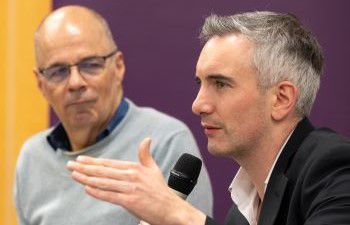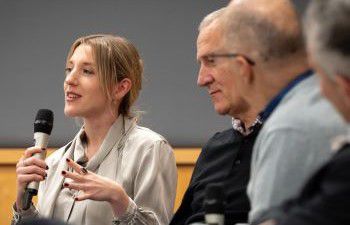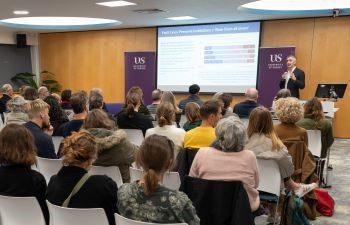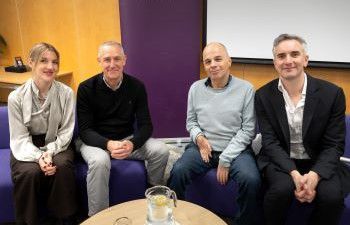Luke Tryl and Sussex academics discuss finding common ground in public opinion at In Conversation event
Posted on behalf of: Internal Communications
Last updated: Monday, 8 December 2025




Luke Tryl, Executive Director of think tank and research agency More in Common, joined us for the latest 'Inclusive Sussex: In Conversation with' event on Tuesday 18 November. Specialising in understanding public opinion on divisive topics, Luke gave a fascinating overview of the current state of UK public opinion, drawing insights from More in Common’s recent 'Shattered Britain' study, which explores public exhaustion with crumbling services and disillusionment with political leadership and also the breadth and depth of viewpoints on universities and on EDI work.
Professor David Ruebain, Pro-Vice-Chancellor (Culture, Equality and Inclusion), hosted the event, and said afterwards: “I was delighted that we were able to host Luke for the In Conversation event. Luke is a well known commentator and contributor to the national dialogue on divisive issues affecting the UK and it was fascinating to hear about some of More in Common’s recent insights in detail, and to discuss how these affect the environment in which universities are operating. Thank you to our panellists, Paul Taggart and Hannah Richter, for contributing to the rich conversation from their own research perspectives, and to everyone who attended and asked such insightful questions.”
Luke’s presentation
Luke’s talk used More in Common’s latest polling information to talk about what issues matter most to people, how people think the UK feels divided and how people generally think things are getting worse. He talked about how this is driving a crisis of trust in national institutions, exhaustion with politics, and many people’s feeling that they are, ‘not living, just surviving.’ At the same time, many people also reported feeling proud of the local area in which they live and Luke discussed how this local pride could be a potential bridge to better social connection on a wider scale. Ending his talk, Luke said: “There is lots of gloom here, but also some green shoots to help get us out of it.”
Throughout the presentation, Luke referred to More in Common’s seven segments, groupings of people that they use to provide a map to help understand the divides and common ground that define the British public. You can take their online quiz to find out which of the seven segments you fit into.
Panel discussion
Following Luke’s talk, David invited two academics from the School of Law, Politics and Sociology, Faculty of Social Sciences to join the conversation, exploring More in Common’s findings, and the intersections with their work. Professor of Politics Professor Paul Taggart and Assistant Professor in Politics Dr Hannah Richter joined Luke and David for an in depth discussion on a range of issues including ‘irrational masses,’ how the UK is shifting to a political model more like many European countries as it moves away from two party politics, and generational differences in news consumption and the impact that has on personal politics.
Questions from the floor
Towards the end of event the panel took questions from attendees, prompting discussion about people’s views on the NHS and its relationship with immigration, the impact of poverty on voting patterns and the rise of racism, and finally, how we can build coalitions and make more of the common ground that is there between groups.
About the event series
The 'Inclusive Sussex: In Conversation with' event series supports our Inclusive Sussex strategy by exploring issues of liberation, equality, diversity and justice with voices from all walks of life, bringing their expertise and lived experiences to the fore.
Sussex has a proud history of welcoming staff and students from the widest range of backgrounds and from all over the world, and in working to create a truly inclusive community that values diversity of identity, background, belief, thought, discipline and method. We continue to strive for Sussex to be a leading example of good practice in advancing equality, diversity and inclusion and a place which welcomes rigorous discussion and debate and where everyone can thrive.
This work supports the UN’s Sustainable Development Goal: SDG 10 (reduced inequalities). You can read more about our work on the SDGs.